2004高考英语重庆
2004高考英语试题全国卷I及答案
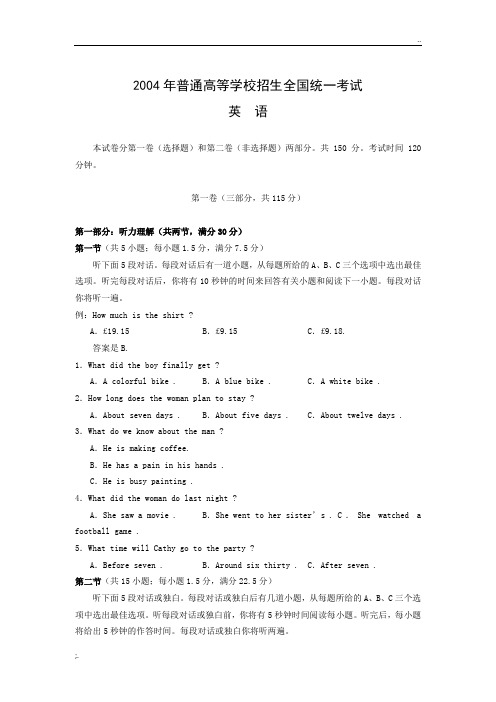
2004年普通高等学校招生全国统一考试英语本试卷分第一卷(选择题)和第二卷(非选择题)两部分。
共150分。
考试时间120分钟。
第一卷(三部分,共115分)第一部分:听力理解(共两节,满分30分)第一节(共5小题;每小题1.5分,满分7.5分)听下面5段对话。
每段对话后有一道小题,从每题所给的A、B、C三个选项中选出最佳选项。
听完每段对话后,你将有10秒钟的时间来回答有关小题和阅读下一小题。
每段对话你将听一遍。
例:How much is the shirt ?A.£19.15 B.£9.15C.£9.18.答案是B.1.What did the boy finally get ?A.A colorful bike . B.A blue bike . C.A white bike .2.How long does the woman plan to stay ?A.About seven days . B.About five days . C.About twelve days . 3.What do we know about the man ?A.He is making coffee.B.He has a pain in his hands .C.He is busy painting .4.What did the woman do last night ?A.She saw a movie . B.She went to her sister’s . C.She watched a football game .5.What time will Cathy go to the party ?A.Before seven . B.Around six thirty . C.After seven .第二节(共15小题;每小题1.5分,满分22.5分)听下面5段对话或独白。
2004年重庆高考英语作文
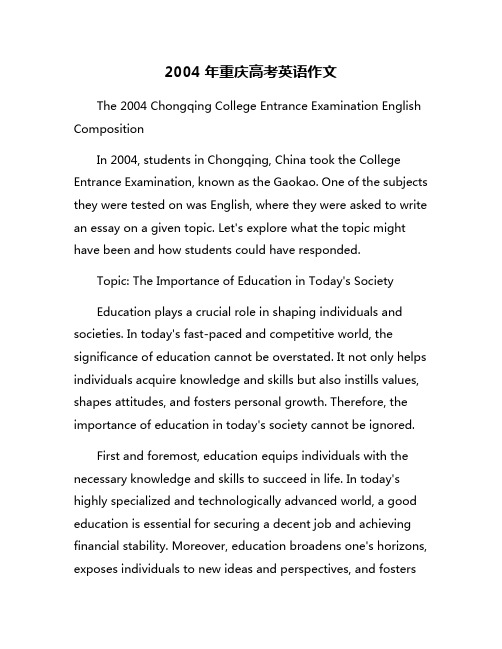
2004年重庆高考英语作文The 2004 Chongqing College Entrance Examination English CompositionIn 2004, students in Chongqing, China took the College Entrance Examination, known as the Gaokao. One of the subjects they were tested on was English, where they were asked to write an essay on a given topic. Let's explore what the topic might have been and how students could have responded.Topic: The Importance of Education in Today's SocietyEducation plays a crucial role in shaping individuals and societies. In today's fast-paced and competitive world, the significance of education cannot be overstated. It not only helps individuals acquire knowledge and skills but also instills values, shapes attitudes, and fosters personal growth. Therefore, the importance of education in today's society cannot be ignored.First and foremost, education equips individuals with the necessary knowledge and skills to succeed in life. In today's highly specialized and technologically advanced world, a good education is essential for securing a decent job and achieving financial stability. Moreover, education broadens one's horizons, exposes individuals to new ideas and perspectives, and fosterscritical thinking and problem-solving skills. In short, education is the key to unlocking one's full potential and realizing one's aspirations.Furthermore, education plays a vital role in promoting social mobility and reducing inequality. By providing equal opportunities for all individuals to access quality education, society can overcome barriers of class, race, and gender. Education empowers individuals to rise above their circumstances, pursue their dreams, and contribute meaningfully to society. It is through education that societies can break the cycle of poverty and create a more equitable and inclusive world for all.In addition, education is essential for promoting cultural understanding and fostering global cooperation. In today's interconnected world, the ability to communicate and collaborate with people from diverse backgrounds is crucial. Education helps individuals develop intercultural competence, empathy, and respect for different cultures and perspectives. By promoting cross-cultural understanding, education can bridge divides, build bridges, and promote peace and harmony among nations.Moreover, education plays a significant role in shaping attitudes and values. By imparting moral and ethical principles, promoting civic responsibility, and fostering a sense of social justice, education helps individuals become responsible and conscientious citizens. It instills values such as honesty, integrity, tolerance, and respect for others, which are essential for building a just, inclusive, and sustainable society.In conclusion, education is the cornerstone of individual success, social progress, and global harmony. In today's dynamic and interconnected world, the importance of education cannot be overstated. It is through education that individuals can realize their full potential, societies can overcome inequality, and the world can achieve peace and prosperity. Therefore, it is essential for governments, educators, parents, and students to recognize the value of education and work together to ensure that everyone has access to quality education and the opportunity to thrive in today's society.Overall, the 2004 Chongqing College Entrance Examination English Composition on the importance of education in today's society would have challenged students to think critically, articulate their ideas effectively, and demonstrate their English language proficiency. It is a topic that remains relevant andsignificant today, as education continues to play a crucial role in shaping individuals, societies, and the world at large.。
2004年全国各省高考英语真题解析
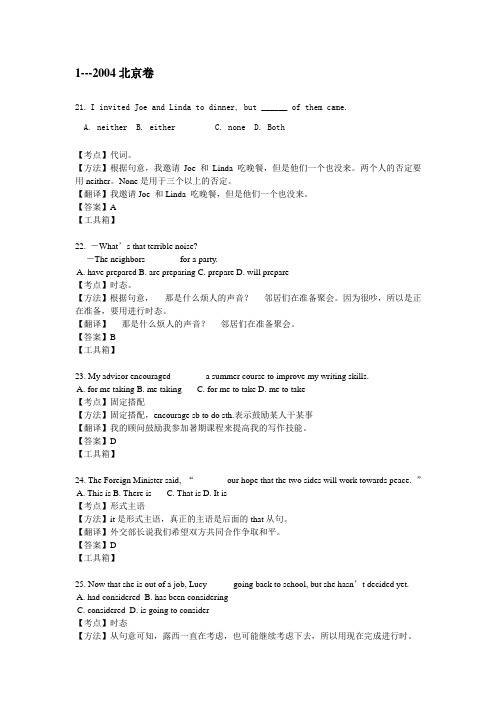
1---2004北京卷21.I invited Joe and Linda to dinner, but ______ of them came.A. neitherB. eitherC. noneD. Both【考点】代词。
【方法】根据句意,我邀请Joe 和Linda 吃晚餐,但是他们一个也没来。
两个人的否定要用neither。
None是用于三个以上的否定。
【翻译】我邀请Joe 和Linda 吃晚餐,但是他们一个也没来。
【答案】A【工具箱】22. -What’s that terrible noise?-The neighbors _______ for a party.A. have preparedB. are preparingC. prepareD. will prepare【考点】时态。
【方法】根据句意,----那是什么烦人的声音?----邻居们在准备聚会。
因为很吵,所以是正在准备,要用进行时态。
【翻译】----那是什么烦人的声音?----邻居们在准备聚会。
【答案】B【工具箱】23. My advisor encouraged _______ a summer course to improve my writing skills.A. for me takingB. me takingC. for me to takeD. me to take【考点】固定搭配【方法】固定搭配,encourage sb to do sth.表示鼓励某人干某事【翻译】我的顾问鼓励我参加暑期课程来提高我的写作技能。
【答案】D【工具箱】24. The Foreign Minister said, “_______ our hope that the two sides will work towards peace. ”A. This isB. There isC. That isD. It is【考点】形式主语【方法】it是形式主语,真正的主语是后面的that从句。
2004年高考试题全国卷英语试题及答案
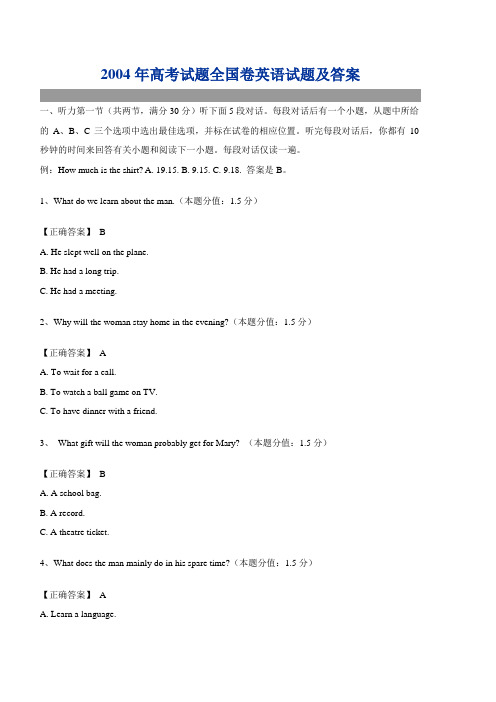
2004年高考试题全国卷英语试题及答案一、听力第一节(共两节,满分30分)听下面5段对话。
每段对话后有一个小题,从题中所给的A、B、C三个选项中选出最佳选项,并标在试卷的相应位置。
听完每段对话后,你都有10秒钟的时间来回答有关小题和阅读下一小题。
每段对话仅读一遍。
例:How much is the shirt? A. 19.15. B. 9.15. C. 9.18. 答案是B。
1、What do we learn about the man.(本题分值:1.5分)【正确答案】 BA. He slept well on the plane.B. He had a long trip.C. He had a meeting.2、Why will the woman stay home in the evening?(本题分值:1.5分)【正确答案】 AA. To wait for a call.B. To watch a ball game on TV.C. To have dinner with a friend.3、What gift will the woman probably get for Mary? (本题分值:1.5分)【正确答案】 BA. A school bag.B. A record.C. A theatre ticket.4、What does the man mainly do in his spare time?(本题分值:1.5分)【正确答案】 AA. Learn a language.B. Do some sports.C. Play the piano.5、What did the woman like doing when she was young?(本题分值:1.5分)【正确答案】 CA. Riding a bicycle with friends.B. Travelling the country.C. Reading alone.二、听力第二节(共15小题,每小题1.5分,满分22.5分)听下面5段对话或独白。
2004年重庆卷高考真题英语试卷-学生用卷

2004年重庆卷高考真题英语试卷-学生用卷一、单项选择(每小题1分,共15分)1、【来源】 2004年高考真题重庆卷第21题1分2017~2018学年9月广东广州海珠区广州市南武中学高二上学期月考第17题0.5分You can eat free in my restaurant you like.A. wheneverB. whereverC. whicheverD. however2、【来源】 2004年高考真题重庆卷第22题1分2017~2018学年北京西城区北京市第四中学高二上学期期末第37题1分The crazy fans patiently for two hours, and they would wait till the movie star arrived.A. were waitingB. had been waitingC. has waitedD. would waited3、【来源】 2004年高考真题重庆卷第23题1分She her hairstyle in her hometown before she came to Chongqing for a better job.A. would changeB. has changedC. had changedD. was changing4、【来源】 2004年高考真题重庆卷第24题1分"The interest be divided into five parts, according to the agreement made by both sides, ” declared the judge.A. mustB. shouldC. mayD. shall5、【来源】 2004年高考真题重庆卷第25题1分I intended to compare notes with a friend, but unfortunately couldn't spare me even one minute.A. theyB. oneC. whoD. it6、【来源】 2004年高考真题重庆卷第26题1分Before the war broke out, many people in safe places possessions they could not take with them.A. threw awayB. put awayC. gave awayD. carried away7、【来源】 2004年高考真题重庆卷第27题1分They see you as something of a worrier,problems which don't exist and crossing bridges long before you come to them.A. settlingB. discoveringC. seeingD. designing8、【来源】 2004年高考真题重庆卷第28题1分—I think George doesn't really care for TV plays.—Right,he still watches the program.A. andB. butC. orD. so9、【来源】 2004年高考真题重庆卷第29题1分There are eight tips in Dr Rogers lecture on sleep, and one of them is:to bed early unless you think it is necessary.A. doesn't goB. not to goC. not goingD. don't go10、【来源】 2004年高考真题重庆卷第30题1分Laws that punish parents for their little children's actions against the laws getparents.A. worriedB. to worryC. worryingD. worry11、【来源】 2004年高考真题重庆卷第31题1分---One week's time has been wasted.---I can't believe we did all that work for.A. somethingB. nothingC. everythingD. anything12、【来源】 2004年高考真题重庆卷第32题1分The most important thing about cotton in history is part that it playedin Industrial Revolution.A. /; /B. the; /C. the; theD. a; the13、【来源】 2004年高考真题重庆卷第33题1分The husband gave his wife every month in order to please her.A. all half his incomeB. his half all incomeC. half his all incomeD. all his half income14、【来源】 2004年高考真题重庆卷第34题1分I failed in the final examination last term and only then the importance of studies.A. I realizedB. I had realizedC. had I realizedD. did I realize15、【来源】 2004年高考真题重庆卷第35题1分—Let's go and have a good drink tonight.—Have you got the first prize in the competition?A. What for?B. Thanks a lot.C. Yes, I'd like to.D. Why not?二、完形填空(每小题1.5分,共30分)16、【来源】 2004年高考真题重庆卷第36题20分2018~2019学年甘肃庆阳宁县高一上学期期末第21~40题40分2019~2020学年甘肃兰州高一上学期期末第21~40题30分2016~2017学年贵州遵义务川仡佬族苗族自治县务川县民族中学高二下学期期中第21~40题30分2015~2016学年天津和平区天津市耀华中学高二上学期期末第31~50题20分A little boy invited his mother to attend his school's first teacher-parent meeting. To the littleboy's1, she said she would go. This2be the first time that his classmates and teacher3his mother and hefelt4of her appearance. Although she was a beautiful woman, there was a severe scar (疤痕) that5nearly the entire right side of her face. The boy never wanted to6why or how she got the scar.At the meeting, the people were7by the kindness and natural beauty of his mother8the scar, but the little boy was still embarrassedand9himself from everyone. He did, however, getwithin10of a conversation between his mother and his teacher.The teacher asked11, "How did you get the scar on your face?"The mother replied, "12my son was a baby, he was in a room that caught fire. Everyone was13afraid to go in because the firewas14so I went in. As I was running toward his bed, I saw a long piece of wood coming down and I placed myself over him trying to protect him. I wasknocked15but fortunately, a fireman came in and saved both of us.She16the burned side of her face. "This scar willbe17, but to this day, I have never18what I did."At this point, the little boy came out running toward his mother with tears in his eyes. He held her in his arms and felt a great19of the sacrifice that his mother had made for him. He held her hand20for the rest of the day.A. enjoymentB. disappointmentC. surpriseD. excitementA. wouldB. couldC. shouldD. mustA. noticedB. greetedC. acceptedD. metA. sickB. ashamedC. afraidD. tiredA. includedB. passedC. coveredD. shadedA. talk aboutB. think aboutC. care aboutD. hear aboutA. impressedB. surprisedC. excitedD. comfortedA. in sight ofB. by means ofC. by way ofD. in spite ofA. hidB. protectedC. separatedD. escapedA. understandingB. remindingC. hearingD. learningA. carefullyB. seriouslyC. nervouslyD. anxiouslyA. AsB. WhenC. SinceD. WhileA. soB. muchC. quiteD. tooA. out of controlB. under controlC. in controlD. over controlA. helplessB. hopelessC. senselessD. uselessA. pointedB. showedC. wipedD. touchedA. uglyB. lastingC. seriousD. frighteningA. forgotB. recognizedC. consideredD. regrettedA. honorB. senseC. happinessD. prideA. quietlyB. slightlyC. tightlyD. suddenly三、阅读理解(每小题2分,共40分)17、【来源】 2004年高考真题重庆卷(A篇)第37题6分Geneva is situated between the Jura Range and the Alps on the western end of Lake Geneva. Capital of Peace is one of its names—the European headquarters of the United Nations lies here in Palais des Nations. Another worthy name for this city with a humanitarian tradition(人道主义传统)and international character is the World's Smallest Metropolis. Parks, splendid stores and lively streets in the old part of town and its 2000-year history wait to be discovered.The Jet d'Eau together with the Flower Watch is the main attraction every year for the tourists visiting Geneva. The Jet d'Eau has become the symbol(象征)of Geneva for a long time. This is a 140 meters high water monument with a rich history. Eight 13, 500-watt projectors light the grand column(圆柱)of the fountain in the evening, from early March until the second Sunday of October. The Flower Watch, which was created at the edge of the English Garden in 1955, reminds us about that Geneva is the birthplace of the Swiss clock and watch making, and that this industry has become internationally famous, as well through the quality of the watches as through their beautiful appearance.Sails on Lake Geneva are also enjoyable. The Lake of Geneva, lying among the Alps, is a true inland sea, making possible a wide range of pleasant boat trips. You can relax and watch the beautiful scenes pass by.(1) Which of the following is NOT suitable for describing Geneva?A. Capital of Peace.B. Palais des nations.C. The World' s Smallest Metropolis.D. The birthplace of the Swiss clock and watch making.(2) The Jet d'Eau in the second paragraph refers to.A. the water fountainB. the English GardenC. a new scene with electric lightingD. the name of a famous watchmaker(3) What do we learn about the Lake of Geneva from the text?A. It is the symbol of Geneva.B. It lies among the Jura Range.C. It has a direct passage to the ocean.D. It is a large body of water of tourist interest.18、【来源】 2004年高考真题重庆卷(B篇)第38题8分2019~2020学年北京西城区北京市第六十六中学高一上学期期中第35~38题8分(每题2分) Since many of you are planning to study at a college or university in this country, you may be curious to know what you usually do in a typical week, how you can get along with your fellow students, and so on. These are the questions I want to discuss with you today.First, let's talk about what your weekly schedule will look like. No matter what your major may be, you can expect to spend between four and six hours a week for each class attending lectures. Lectures are usually in very large rooms because some courses such as introduction to sociology or economics often have as many as two or three hundred students, especially at large universities. In lectures, it's very important for you to take notes on what the professor says because the information in a lecture is often different from the information in your textbooks. Also, you can expect to have exam questions based on the lectures. So it isn't enough to just read your textbooks; you have to attend lectures as well. In a typical week you will also have a couple of hours of discussion for every class you take. The discussion section is a small group meeting usually with fewer than thirty students where you can ask questions about the lectures, the reading, and the homework. In large universities, graduate students, called teaching assistants, usually direct discussion sections.If your major is chemistry, or physics, or another science, you'll also have to spend several hours a week in the lab, or laboratory, doing experiments. This means that science majors spend more time in the classroom than non-science majors do. On the other hand, people who major in subjects like literature or history usually have to read and write more than science majors do.(1) The main purpose of this text is.A. to help the students to learn about university lifeB. to persuade the students to attend lecturesC. to encourage the students to take part in discussionsD. to advise the students to choose proper majors(2) We can learn from the passage that university professors.A. spend about 5 hours on lectures each weekB. must join the students in the discussion sectionsC. prefer to use textbooks in their lecturesD. require the students to read beyond the textbooks(3) A discussion section does NOT include.A. working under the guidance of university professorsB. talking over what the students have read about the coursesC. discussing the problems related to the students' homeworkD. raising questions about what a professor has said in a lecture(4) According to the author, science majors.A. have to work harder than non-science majorsB. spend less time on their studies than non-science majorsC. consider experiments more important than discussionsD. read and write less than non-science majors19、【来源】 2004年高考真题重庆卷(C篇)第39题10分A letter to Edward, a columnist(专栏作家)Dear Mr. Expert,I grew up in an unhappy and abusive home. I always promised myself that I'd get out as soon as possible. Now, at age 20, I have a good job and a nice house, and I'm really proud of the independence I've achieved.Here's the problem: several of my friends who still live with their parents wish they had places like mine so much so that they make mine theirs.It started out with a couple of them spending the weekends with me. But now they seem to take it for granted that they can show up at any time they like. They bring boyfriends over, talk on the phone and stay out forever.I enjoy having my friends here sometimes—it makes the place feel comfortable and warm but this is my home, not a party house. I was old enough to move out on my own, so why can't I seem to ask my friends to respect my privacy (隐私)?JoanEdward's reply to JoanDear Joan,If your family didn't pay attention to your needs when you were a child, you probably have trouble letting others know your needs now.And if you've gathered your friends around you to rebuild a happy family atmosphere (气氛),you may fear that saying no will bring back the kind of TAL#NBSP conflict fight you grew up with—or destroy the nice atmosphere you now enjoy. You need to understand that in true friendship it's okay to put your own needs first from time to time.Be clear about the message you want to send. For example, "I really love your company but I also need some privacy. So please call before you come over."Edward(1) We can learn from the first letter that Joan.A. lives away from her parentsB. takes pride in her friendsC. knows Mr. Expert quite wellD. hates her parents very much(2) We can infer from the first letter that.A. Joan considers her friends more important than her privacyB. Joan's friends visit her more often than she can acceptC. Joan doesn't like the parties at allD. Joan dislikes the boyfriends her friends bring over(3) According to Mr. Expert, why can't Joan tell her friends her feelings?A. She is afraid of hurting her friends.B. She does not understand true friendship.C. Her family experience stops her from doing so.D. She does not put her needs first.(4) The underlined word "conflict" in the second letter means.A. dependent lifeB. fierce fightC. bad mannersD. painful feeling(5) The second letter suggests that Mr. Expert.A. is worried about Joan's problemB. warns Joan not to quarrel with her friendsC. advises Joan on how to refuse peopleD. encourages Joan to be brave enough20、【来源】 2004年高考真题重庆卷(D篇)第40题8分Have you ever had the strange feeling that you were being watched? You turned around and, sure enough, someone was looking right at you!Parapsychologists(灵学家) say that humans have natural ability to sense when someone is looking at them. To research whether such a "sixth sense" really exists, Robert Baker, a psychologist(心理学家) at the University of Kentucky, performed two experiments.In the first one, Baker sat behind unknowing people in public places and stared at the backs of their heads for 5 to15 minutes The subjects(受试者)were eating, drinking, reading, studying, watching TV, or working at a computer. Baker made sure that the people could not tell that he was sitting behind them during those periods. Later, when he questioned the subjects, almost all of them said they had no sense that someone was staring at them.For the second experiment, Baker told the subjects that they would be stared at from time to time from behind a two-way mirror in a laboratory setting. The people had to write down when they felt they were being stared at and when they weren't.Baker found that the subjects were no better at telling when they were stared at than if they had just guessed. Baker concludes that people do not have the ability to sense when they're being stared at. Ifpeople doubt the TAL#NBSP outcome of his two experiments, said Baker, " I suggest they repeat the experiments and see for themselves".(1) The purpose of the two experiments is to.A. explain when people can have a sixth senseB. show how people act while being watched in the labC. study whether humans can sense when they are stared atD. prove why humans have a sixth sense(2) In the first experiment, the subjects.A. were not told that they would be stared atB. lost their sense when they were stared atC. were not sure when they would be stared atD. were uncomfortable when they were stared at(3) The underlined word "outcome" in the last paragraph most probablymeans.A. valueB. resultC. performanceD. connection(4) What can be learned from the passage?A. People are born with a sixth sense.B. The experiments support parapsychologists' idea.C. The subjects do not have a sixth sense in the experiments.D. People have a sixth sense in public places.21、【来源】 2004年高考真题重庆卷(E篇)第41题8分Besides giving off gases and dusts into the air, humans produce waste that is poured on the environment. Often, this waste produced by major industries and people is harmful to both nature and human life.One of the main causes of the large amount of dangerous waste is that people do not realize how large a problem it is. Because it can be simply removed and sent to a landfill(废渣填埋场), the problem is often believed to end there. In addition, industries have often shown an unwillingness to find ways to deal with dangerous waste because of the related expenses. Many industries and governments build simple landfills to store waste and often just pour waste chemicals into nearby bodies of water. Often, chemicals used for industrial production cause dangerous forms of waste. The amount of these chemicals has increased greatly in the past, but it is often difficult and expensive to get rid of these chemicals or to store them in a way safe to human life and the environment.Every year, major health problems result from dangerous waste. Sadly, it is often only after someone has died or become seriously ill that governments will take measures to reduce levels of harmful waste.Some governments have realized how serious the dangerous waste problem is and are now trying to settle this problem. They are also trying to limit the amount of waste industries which are allowed to produce.Not only governments but ordinary people as well must work together to solve the problem. They can choose not to buy those products which require the production of dangerous waste, and produce less harmful waste themselves. Many scientists think that waste production can be cut. The waste can be reduced by at least one third using existing technologies and methods.(1) What would be the best title for the text?A. Measures of Reducing Dangerous WasteB. Danger of Harmful Waste to MankindC. Dangerous Waste and Water PollutionD. Environmental Protection(2) According to the text, people.A. do not produce harmful waste in their daily lifeB. do not know where to place the dangerous wasteC. are not clear about how serious the dangerous waste problem isD. are not sure about where harmful waste ends(3) What troubles industries most in dealing with the dangerous waste problem?A. How to get government support.B. How to increase their production.C. How to store harmful waste.D. How to cut down the related costs.(4) What can be inferred from the passage?A. The polluting industries are not allowed to sell their products.B. Present technologies have settled the harmful waste problemC. Everyone should obey the government rules for the problem.D. To solve the problem requires the efforts of the whole society.四、短文改错(每小题1分,共10分)22、【来源】 2004年高考真题重庆卷第42题10分此题要求改正所给短文中的错误。
2004年重庆高考英语试题及答案

2004年普通高等学校招生全国统一考试·英语试题·重庆卷第一卷(三部分,共115分)第一部分听力(共两节,满分 30 分)第一节(共5小题;每小题 1.5 分,满分7.5 分)听下面5 段对话。
每段对话有一个小题,从题中所给的A、B、C 三个选项中选出最佳选项,并从标在试题卷的相应位置。
听完每段对话后,你都有10 秒钟的时间来回答有关小题和阅读下一小题。
每段对话仅读一遍。
例:How much is the shirt?A. £19.5B. £9.15C. £9.18答案是B。
1. Where does this conversation take place?A. At a bankB. At a hospitalC. At a post office2. What are the two speakers mainly talking about?A. What they do while traveling.B. When they do their homework.C. How they spend their spare time.3. What is the probable relationship between the two speakers?A. Husband and wife.B. Passenger and conductor.C. Customer and shop assistant.4. What happens to Mr Jordan?A. He is ill.B. He is out of work.C. He is on holiday.5. What does the woman mean?A. She wants to go on watching TV.B. She wants the man to turn the TV off.C. She does not mind what the man will do.第二节(共15 小题;每小题 1.5 分,满分22.5 分)听下面5 段对话或独白。
重庆市20042010年高考英语
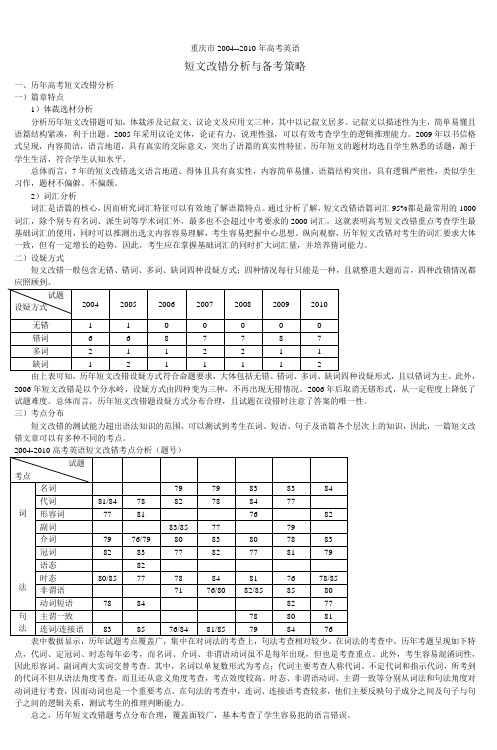
重庆市2004--2010年高考英语短文改错分析与备考策略一、历年高考短文改错分析一)篇章特点1)体裁选材分析分析历年短文改错题可知,体裁涉及记叙文、议论文及应用文三种,其中以记叙文居多。
记叙文以描述性为主,简单易懂且语篇结构紧凑,利于出题。
2005年采用议论文体,论证有力,说理性强,可以有效考查学生的逻辑推理能力。
2009年以书信格式呈现,内容简洁,语言地道,具有真实的交际意义,突出了语篇的真实性特征。
历年短文的题材均选自学生熟悉的话题,源于学生生活,符合学生认知水平。
总体而言,7年的短文改错选文语言地道、得体且具有真实性,内容简单易懂,语篇结构突出,具有逻辑严密性,类似学生习作,题材不偏僻、不偏颇。
2)词汇分析词汇是语篇的核心,因而研究词汇特征可以有效地了解语篇特点。
通过分析了解,短文改错语篇词汇95%都是最常用的1000词汇,除个别专有名词、派生词等学术词汇外,最多也不会超过中考要求的2000词汇,这就表明高考短文改错重点考查学生最基础词汇的使用,同时可以推测出选文内容容易理解,考生容易把握中心思想。
纵向观察,历年短文改错对考生的词汇要求大体一致,但有一定增长的趋势,因此,考生应在掌握基础词汇的同时扩大词汇量,并培养猜词能力。
二)设疑方式短文改错一般包含无错、错词、多词、缺词四种设疑方式;四种情况每行只能是一种,且就整道大题而言,四种改错情况都应照顾到。
由上表可知,历年短文改错设疑方式符合命题要求,大体包括无错、错词、多词、缺词四种设疑形式,且以错词为主。
此外,2006年短文改错是以个分水岭,设疑方式由四种变为三种,不再出现无错情况。
2006年后取消无错形式,从一定程度上降低了试题难度。
总体而言,历年短文改错题设疑方式分布合理,且试题在设错时注意了答案的唯一性。
三)考点分布短文改错的测试能力超出语法知识的范围,可以测试到考生在词、短语、句子及语篇各个层次上的知识,因此,一篇短文改错文章可以有多种不同的考点。
2004重庆卷年年高考英语真题完形填空题完全解析
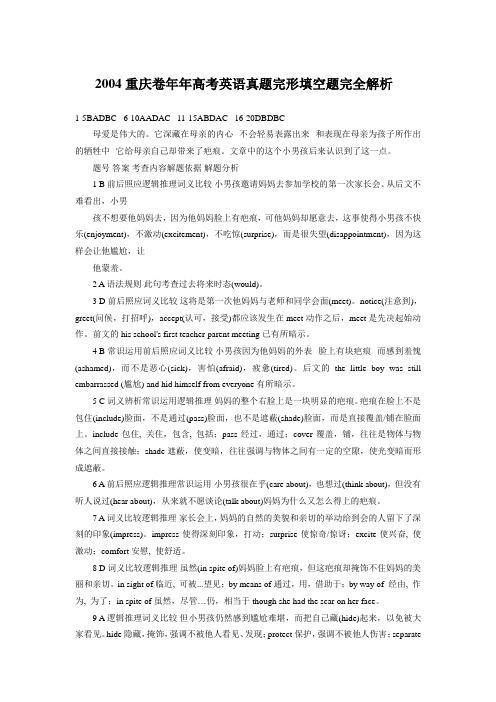
2004重庆卷年年高考英语真题完形填空题完全解析1-5BADBC 6-10AADAC 11-15ABDAC 16-20DBDBC母爱是伟大的。
它深藏在母亲的内心--不会轻易表露出来--和表现在母亲为孩子所作出的牺牲中--它给母亲自己却带来了疤痕。
文章中的这个小男孩后来认识到了这一点。
题号答案考查内容解题依据解题分析1 B 前后照应逻辑推理词义比较小男孩邀请妈妈去参加学校的第一次家长会。
从后文不难看出,小男孩不想要他妈妈去,因为他妈妈脸上有疤痕,可他妈妈却愿意去,这事使得小男孩不快乐(enjoyment),不激动(excitement),不吃惊(surprise),而是很失望(disappointment),因为这样会让他尴尬,让他蒙羞。
2 A 语法规则此句考查过去将来时态(would)。
3 D 前后照应词义比较这将是第一次他妈妈与老师和同学会面(meet)。
notice(注意到),greet(问候,打招呼),accept(认可,接受)都应该发生在meet动作之后,meet是先决起始动作。
前文的his school's first teacher-parent meeting已有所暗示。
4 B 常识运用前后照应词义比较小男孩因为他妈妈的外表--脸上有块疤痕--而感到羞愧(ashamed),而不是恶心(sick),害怕(afraid),疲惫(tired)。
后文的the little boy was still embarrassed (尴尬) and hid himself from everyone有所暗示。
5 C 词义辨析常识运用逻辑推理妈妈的整个右脸上是一块明显的疤痕。
疤痕在脸上不是包住(include)脸面,不是通过(pass)脸面,也不是遮蔽(shade)脸面,而是直接覆盖/铺在脸面上。
include包住, 关住,包含, 包括;pass经过,通过;cover覆盖,铺,往往是物体与物体之间直接接触;shade遮蔽,使变暗,往往强调与物体之间有一定的空隙,使光变暗而形成遮蔽。
2004年全国普通高考英语试卷
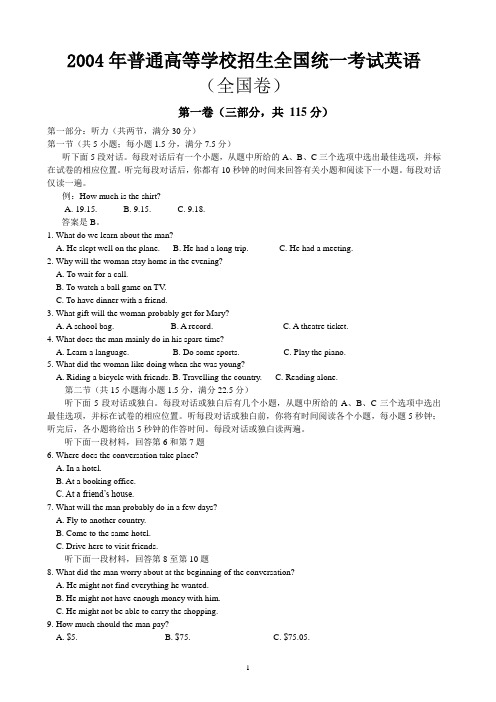
2004年普通高等学校招生全国统一考试英语(全国卷)第一卷(三部分,共 115分)第一部分:听力(共两节,满分30分)第一节(共5小题;每小题1.5分,满分7.5分)听下面5段对话。
每段对话后有一个小题,从题中所给的A、B、C三个选项中选出最佳选项,并标在试卷的相应位置。
听完每段对话后,你都有10秒钟的时间来回答有关小题和阅读下一小题。
每段对话仅读一遍。
例:How much is the shirt?A. 19.15.B. 9.15.C. 9.18.答案是B。
1. What do we learn about the man?A. He slept well on the plane.B. He had a long trip.C. He had a meeting.2. Why will the woman stay home in the evening?A. To wait for a call.B. To watch a ball game on TV.C. To have dinner with a friend.3. What gift will the woman probably get for Mary?A. A school bag.B. A record.C. A theatre ticket.4. What does the man mainly do in his spare time?A. Learn a language.B. Do some sports.C. Play the piano.5. What did the woman like doing when she was young?A. Riding a bicycle with friends.B. Travelling the country.C. Reading alone.第二节(共15小题海小题1.5分,满分22.5分)听下面5段对话或独白。
(2004年-2008)年高考英语重庆卷完形填空考点效度分析

40 1) 0 7
考 语 法而 高层 次 的 考点 则 往往 更 侧重 于 考意 义 。考 点 为考 意 义 的题 目同时 也 能考 语法 .而焦 点 为考 语 法的 题 目则 不 能 同时 考 意 义 ”李 筱菊 ,9 7 。这 种情 形 对 于开 放 式 完形 填 空试 题 而 言 ( 19 ) 是 完 全正 确 的 ,但 由 于选 择式 完 形填 空 的开 放 程度 低 于开 放 式 的题 目, 试 题效 度 也被 减 弱 了 。尽管 如 此 , 其 考虑 到 试题 信 度 的 原因 , 选择 式 完形 填 空还 是 有它 的优势 。因此 , 完形 填 空题 的 删
、
引 言
完 形 填 空一 直 以来都 是 高 考 英 语 的典 型 题 型 . 被 认 为是 它 种 能 测试 学 生综 合 语 言运 用 能 力 的有 效方 式 。 完形 填 空英 语 称 为e z ts。“ 词 来 自c sr, l eet 此 o l ue 意思 是 使 未 能 闭合 的东 西 闭 o 合起 来 ” 李筱 菊 .9 7 。这 种 题 型是 T y r 15 年根 据 格 式 ( 19 ) al  ̄ 9 3 o 塔心 理 所 发 明的 。格 式 塔 心理 有 称补 全 心 理 。“ 思 是 , 意 人们 根 据 脑 子里 对 事 物 的 完 整 概 念 , 见 不 完 整 的 事 物 , 会 在 思 想 看 便 里把 它 补 全 起来 。应 用 于语 言 现 象 , 们 对不 完 整 的 语言 也 有 人 这种 补 全 心理 ”李 筱 菊 ,9 7 。这是 由于利 用 了 自然 语 言 的语 ( 19 ) 言羡 余 现 象 。 当 阅读 一 篇 语 言材 料 时 , 者 可 以根 据 上下 文 把 读 缺失 的内 容补 全 。完 形 填 空 的理论 基 础 是单 一 能 力假 说 。这 一 假 说认 为 , 的语 言综 合 运 用 是 一 种 单一 的 能 力 , 现 这 种 单 人 体 能 力 的表 征 行 为也 是单 一 的 。而完 形 填空 测 试 的正 是这 种 单 能力。 如果 真是 这 样 , 言测 试 就省 事 了 。 经 过人 们 的试 验 语 但 发现 . 运用 语 言 的 能力 根 本 就 不 是 单 一 的 能力 , 除 不 同的 人 删 完形 填 空 , 测试 出的 结果 就 不一 样 。因此 , 形 填 空 的具体 删 除 完 项 目和 提供 的选 项 . 在很 大 程度 上 决定 了完 形填 空 的效 度 。 完 形 填 空 的效 度 问题 多 年 来 一 直 是 人 们 研 究 的 热 点 问 题 。2 0 年 , 0 4 重庆 首 次 自主命 高 考 英 语 试 题 , 文 选 择 了 四年 本 的 高考 英 语 试 题 中 的 完 形 填 空 .以 李 筱 菊 教 授 提 出 的 考 点 效 度 概 念对 试 卷 进 行 分 析 . 以对 该 题 的命 题 质 量 进 行 评 估 。
2004年高考阅读(重庆卷)
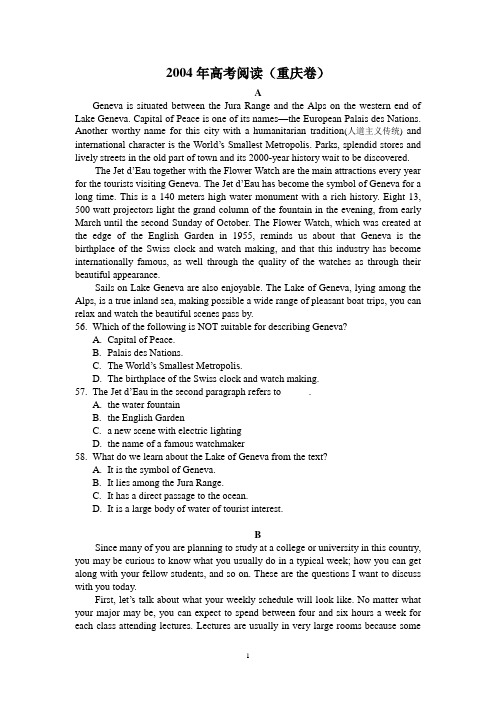
2004年高考阅读(重庆卷)AGeneva is situated between the Jura Range and the Alps on the western end of Lake Geneva. Capital of Peace is one of its names—the European Palais des Nations. Another worthy name for this city with a humanitarian tradition(人道主义传统)and in ternational character is the World’s Smallest Metropolis. Parks, splendid stores and lively streets in the old part of town and its 2000-year history wait to be discovered.The Jet d’Eau together with the Flower Watch are the main attractions every year for the tourists visiting Geneva. The Jet d’Eau has become the symbol of Geneva for a long time. This is a 140 meters high water monument with a rich history. Eight 13, 500 watt projectors light the grand column of the fountain in the evening, from early March until the second Sunday of October. The Flower Watch, which was created at the edge of the English Garden in 1955, reminds us about that Geneva is the birthplace of the Swiss clock and watch making, and that this industry has become internationally famous, as well through the quality of the watches as through their beautiful appearance.Sails on Lake Geneva are also enjoyable. The Lake of Geneva, lying among the Alps, is a true inland sea, making possible a wide range of pleasant boat trips, you can relax and watch the beautiful scenes pass by.56. Which of the following is NOT suitable for describing Geneva?A.Capital of Peace.B.Palais des Nations.C.The World’s Smallest Metropolis.D.The birthplace of the Swiss clock and watch making.57. The Jet d’Eau in the second paragraph refers to _____.A.the water fountainB.the English GardenC. a new scene with electric lightingD.the name of a famous watchmaker58. What do we learn about the Lake of Geneva from the text?A.It is the symbol of Geneva.B.It lies among the Jura Range.C.It has a direct passage to the ocean.D.It is a large body of water of tourist interest.BSince many of you are planning to study at a college or university in this country, you may be curious to know what you usually do in a typical week; how you can get along with your fellow students, and so on. These are the questions I want to discuss with you today.First, let’s talk about what your weekly schedule will look like. No matter what your major may be, you can expect to spend between four and six hours a week for each class attending lectures. Lectures are usually in very large rooms because somecourses such as introduction to sociology or economics often have as many as two or three hundred students, especially at large universities. In lectures, it’s v ery important for you to take notes on what the professor says because the information in a lecture is often different from the information in your textbooks. Also, you can expect to have exam questions based on the lectures. So it isn’t enough to just rea d your textbooks; you have to attend lectures as well. In a typical week you will also have a couple of hours of discussion for every class you take. The discussion section is a small group meeting usually with fewer than thirty students where you can ask questions about the lectures, the reading, and the homework. In large universities, graduate students, called teaching assistants, usually direct discussion sections.If your major is chemistry, or physics, or another science, you’ll also have to spend several hours a week in the lab, or laboratory, doing experiments. This means that science majors spend more time in the classroom than non-science majors do. On the other hand, people who major in subjects like literature or history usually have to read and write more than science majors do.59. The main purpose of this text is _____.A.to help the students to learn about university lifeB.to persuade the students to attend lecturesC.to encourage the students to take part in discussionsD.to advise the students to choose proper majors60. We can learn from the passage that university professors _____.A.spend about 5 hours on lectures each weekB.must join the students in the discussion sectionsC.prefer to use textbooks in their lecturesD.require the students to read beyond the textbooks61. A discussion section does NOT include _____.A.working under the guidance of university professorsB.talking over what the students have read about the coursesC.discussing the problems related to the students’ homeworkD.raising questions about what a professor has said in a lecture62. According to the author, science majors _____.A.have to work harder than non-science majorsB.spend less time on their studies than non-science majorsC.consider experiments more important than discussionsD.read and write less than non-science majorsCA letter to Edward, a columnist(报刊专栏作家)Dear Mr. Expert:I grew up in an unhappy and abusive home. I always p romised myself that I’d get out as soon as possible. Now, at age 20, I have a good job and a nice house, and I’m really proud of the independence I’ve achieved.Here’s the problem: several of my friends who still live with their parents wish they had places like mine—so much so that they make mine theirs.It started out with a couple of them spending the weekends with me. But now they seem to take it for granted that they can show up any time they like. They bring boyfriends over, talk on the phone and stay out forever.I enjoy having my friends here sometimes—it makes the place feel comfortable and warm—but this is my home, not a party house. I was old enough to move out on my own, so why can’t I seem to ask my friends to respect my pri vacy?Joan Edward’s reply to JoanDear Joan:If your family didn’t pay attention to your needs when you were a child, you probably have trouble letting others know your needs now.And if you’ve gathered your friends around you to rebuild a happy family atmosphere, you may fear that saying no will bring back the kind of conflict you grew up with—or destroy the nice atmosphere you now enjoy. You need to understand that in true friendship it’s okay to put your own needs first from time to time.Be clear about the message you want to send. For example, “I really love your company but I also need some privacy. So please call before you come over.”63. We can learn from the first letter that Joan Edward _____.A. lives away from her parentsB. takes pride in her friendsC. knows Mr. Expert quite wellD. hates her parents very much64. We can infer from the first letter that _____.A.Joan considers her friends more important than her privacyB.Joan’s friends vi sit her more often than she can acceptC.Joan doesn’t like the parties at allD.Joan dislikes the boyfriends her friends bring over65. According to Mr. Expert, why can’t Joan tell her friends her feelings?A.She is afraid of hurting her friends.B.She does not understand true friendship.C.Her family experience stops her from doing so.D.She does not put her needs first.66. The underlined word “conflict” in the second letter means _____.A. dependent lifeB. fierce fightC. bad mannersD. painful feeling67. The second letter suggests that Mr. Expert _____.A.is worried about Joan’s problemB.warns Joan not to quarrel with her friendsC.advises Joan on how to refuse peopleD.encourages Joan to be brave enoughDHave you ever had the strange feeling that you were being watched? You turned around and, sure enough, someone was looking right at you!Parapsychologists(灵学家) say that humans have a natural ability to sense when someone is looking at them. To research whether such a “sixth sense” really exists,Robert Baker, a psychologist at the University of Kentucky, performed two experiments.In the first one, Baker sat behind unknowing people in public places and stared at the backs of their heads for 5 to 15 minutes. The subjects(受试者)were eating, drinking, reading, studying, watching TV, or working at a computer. Baker made sure that the people could not tell that he was sitting behind them during those periods. Later, when he questioned the subjects, almost all of them said they had no sense that someone was staring at them.For the second experiment, Baker told the subjects that they would be stared at from time to time from behind a two-way mirror in a laboratory setting. The people had to write down when they felt they were being stared at and when they weren’t. Baker found that the subjects were no better at telling when they were stared at and when they weren’t. Baker found that the subjects were no better at telling when they were started at than if they had just guessed.Baker concludes that people do not have the ability to sense when they’re being stared at. If people doubt the outcome of his two experiments, said Baker, “I suggest they repeat the experiments and see for themselves.”68. The purpose of the two experiments is to _____.A.explain when people can have a sixth senseB.show how people act while being watched in the labC.study whether humans can sense when they are stared atD.prove why humans have a sixth sense69. In the first experiment, the subjects _____.A.were not told that they would be stared atB.lost their sense when they were stared atC.were not sure when they would be stared atD.were uncomfortable when they were stared at70. The underlined word “outcome” in the last paragraph most probably means_____.A. valueB. resultC. performanceD. connection71. What can be learned from the passage?A.People are born with a sixth sense.B.The experime nts support parapsychologists’ idea.C.The subjects do not have a sixth sense in the experiments.D.People have a sixth sense in public places.EBesides giving off gases and dusts into the air, humans produce waste that is poured on the environment. Often, this waste produced by major industries and people is harmful to both nature and human life.One of the main causes of the large amount of dangerous waste is that people do not realize how large a problem it is. Because it can be simply removed and sent to a landfill(废渣填埋场), the problem is often believed to end there. In addition, industrieshave often shown an unwillingness to find ways to deal with dangerous waste because of the related expenses. Many industries and governments build simple landfills to store waste, and often just pour waste chemicals into nearby bodies of water. Often, chemicals used for industrial production cause dangerous forms of waste. The amount of these chemicals has increased greatly in the past, but it is often difficult and expensive to get rid of these chemicals or to store them in a way safe to human life and the environment.Every year, major health problems result from dangerous waste. Sadly, it is often only after someone has died or become seriously ill that governments will take measures to reduce levels of harmful waste.Some governments have realized how serious the dangerous waste problem is and are now trying to settle this problem. They are also trying to limit the amount of waste industries are allowed to produce.Not only governments but ordinary people as well must work together to solve the problem. They can choose not to buy those products which require the production of dangerous waste, and produce less harmful waste themselves. Many scientists think that waste production can be cut. The waste can be reduced by at least one third using existing technologies and methods.72. What would be the best title for the text?A.Measures of Reducing Dangerous Waste.B.Danger of Harmful Waste to Mankind.C.Dangerous Waste and Water Pollution.D.Environmental Protection.73. According to the text, people _____.A.do not produce harmful waste in their daily lifeB.do not know where to place the dangerous wasteC.are not clear about how serious the dangerous waste problem isD.are not sure about where harmful waste ends74. What troubles industries most in dealing with the dangerous waste problem?A. How to get government support.B. How to increase their production.C. How to store harmful waste.D. How to cut down the related costs.75. What can be inferred from the passage?A.The polluting industries are not allowed to sell their products.B.Present technologies have settled the harmful waste problem.C.Everyone should obey the government rules for the problem.D.To solve the problem requires the efforts of the whole society.56—60 BADAD 61—65 ADABC 66—70 BCCAB 71—75 CBCDD。
2004年高考试题——英语(全国卷3)

2004年全国普通高等学校招生全国统一考试英语第一部分:听力(共两节,满分30分)第一节(共5小题;每小题1.5分,满分7.5分)听下面5段对话。
每段对话后有一个小题,从题中所给的ABC 三个选项中选出最佳选项,并标在试卷的相应位置。
听完每段对话后,你将有10秒钟的时间来回答有关小题和阅读下一小题。
每段对话仅读一遍。
1. Where are the two speakers?A. In a shop.B. In a restaurant.C. In a post office.2. How much cheaper are the smaller apples?A. 10 cents.B. 14 cents.C. 30 cents.3. Why does Chris look fresh and energetic?A. He swims quite often.B. He slept well last night.C. He went to a fitness class.4. What do you know about the man?A. He is an office clerk.B. he is a shop assistant.C. He is a political leader.5. What is Rosalie probably doing now?A. Driving to the airport.B. Typing in the office.C. Shopping in a store.第二节(共15小题,每小题1.5分,满分22.5分)听下面五段对话或独白。
每段对话或独白后有几个小题,从题中所给的A、B、C三个选项中选出最佳选项,并标在答题卷的相应位置。
听每段对话或独白前,你将有时间阅读各个小题,每小题5秒钟;听完后,各小题将给出5秒钟的作答时间。
每段对话或独白读两遍。
2004年高考英语试题分类解析 形容词与副词
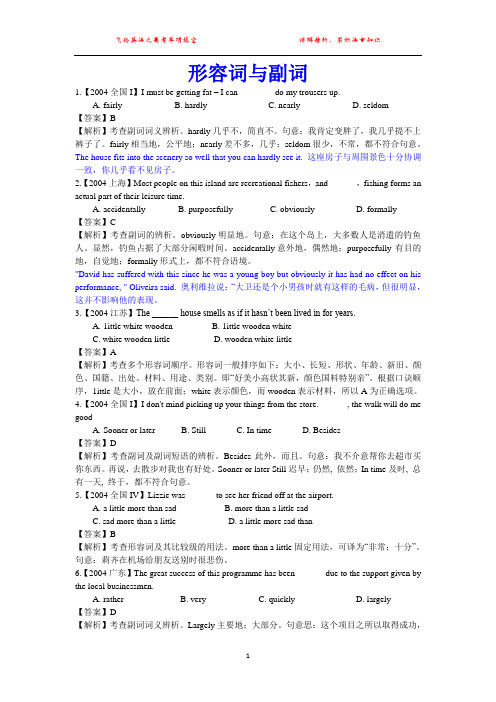
形容词与副词1.【2004全国I】I must be getting fat – I can ______ do my trousers up.A. fairlyB. hardlyC. nearlyD. seldom【答案】B【解析】考查副词词义辨析。
hardly几乎不,简直不。
句意:我肯定变胖了,我几乎提不上裤子了。
fairly相当地,公平地;nearly差不多,几乎;seldom很少,不常,都不符合句意。
The house fits into the scenery so well that you can hardly see it. 这座房子与周围景色十分协调一致,你几乎看不见房子。
2.【2004上海】Most people on this island are recreational fishers,and ______,fishing forms an actual part of their leisure time.A. accidentallyB. purposefullyC. obviouslyD. formally【答案】C【解析】考查副词的辨析。
obviously 明显地。
句意:在这个岛上,大多数人是消遣的钓鱼人。
显然,钓鱼占据了大部分闲暇时间。
accidentally 意外地,偶然地;purposefully有目的地,自觉地;formally形式上,都不符合语境。
"David has suffered with this since he was a young boy but obviously it has had no effect on his performance, " Oliveira said. 奥利维拉说:―大卫还是个小男孩时就有这样的毛病,但很明显,这并不影响他的表现。
3.【2004江苏】The ______ house smells as if it hasn’t been lived in for years.A. 1ittle white woodenB. 1ittle wooden whiteC. white wooden littleD. wooden white little【答案】A【解析】考查多个形容词顺序。
2004年高考英语 重庆卷
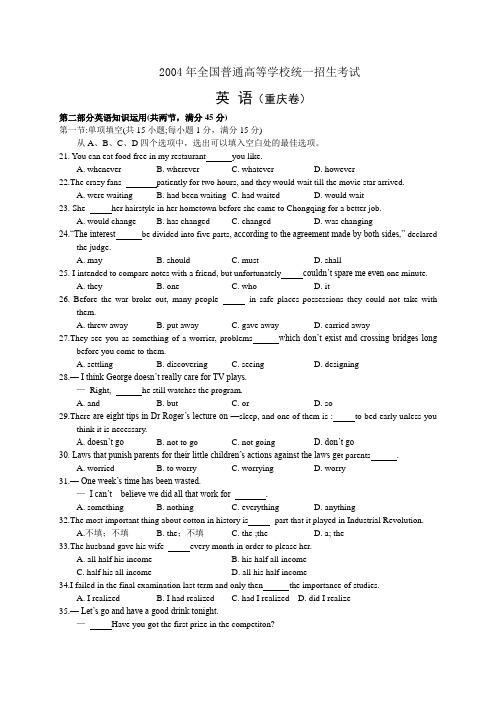
2004年全国普通高等学校统一招生考试英语(重庆卷)第二部分英语知识运用(共两节,满分45分)第一节:单项填空(共15小题;每小题1分,满分15分)从A、B、C、D四个选项中,选出可以填入空白处的最佳选项。
21. You can eat food free in my restaurant you like.A. wheneverB. whereverC. whateverD. however22.The crazy fans patiently for two hours, and they would wait till the movie star arrived.A. were waitingB. had been waitingC. had waitedD. would wait23. She her hairstyle in her hometown before she came to Chongqing for a better job.A. would changeB. has changedC. changedD. was changing24.“The interest be divided into five parts, according to the agreement made by both sides,” declaredthe judge.A. mayB. shouldC. mustD. shall25. I intended to compare notes with a friend, but unfortunately couldn’t spare me even one minute.A. theyB. oneC. whoD. it26. Before the war broke out, many people in safe places possessions they could not take withthem.A. threw awayB. put awayC. gave awayD. carried away27.They see you as something of a worrier, problems which don’t exist and crossing bridges longbefore you come to them.A. settlingB. discoveringC. seeingD. designing28.—I think George doesn’t really care for TV plays.—Right, he still watches the program.A. andB. butC. orD. so29.There are eight tips in Dr Roger’s lecture on —sleep, and one of them is : to bed early unless youthink it is necessary.A. doesn’t goB. not to goC. not goingD. don’t go30. Laws that punish parents for their little children’s actions against the laws ge t parents .A. worriedB. to worryC. worryingD. worry31.—One week’s time has been wasted.—I can’t believe we did all that work for .A. somethingB. nothingC. everythingD. anything32.The most important thing about cotton in history is part that it played in Industrial Revolution.A.不填;不填B. the;不填C. the ;theD. a; the33.The husband gave his wife every month in order to please her.A. all half his incomeB. his half all incomeC. half his all incomeD. all his half income34.I failed in the final examination last term and only then the importance of studies.A. I realizedB. I had realizedC. had I realizedD. did I realize35.—Let’s go and have a good drink tonight.—Have you got the first prize in the competiton?A. What for?B. Thanks a lot.C. Yes, I’d like to.D. Why not?第二节:完形填空(共20小题;每小题1.5分,满分30分)阅读下面短文,掌握其大意,然后从36—55各题的四个选项(A、B、C和D)中,选出可以填入空白处的最佳选项。
2004高考英语全国卷试题及详解
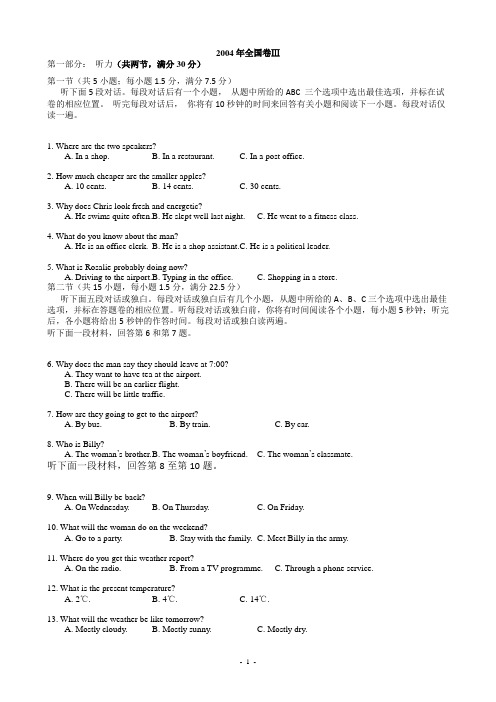
2004年全国卷Ⅲ第一部分:听力(共两节,满分30分)第一节(共5小题;每小题1.5分,满分7.5分)听下面5段对话。
每段对话后有一个小题,从题中所给的ABC 三个选项中选出最佳选项,并标在试卷的相应位置。
听完每段对话后,你将有10秒钟的时间来回答有关小题和阅读下一小题。
每段对话仅读一遍。
1. Where are the two speakers?A. In a shop.B. In a restaurant.C. In a post office.2. How much cheaper are the smaller apples?A. 10 cents.B. 14 cents.C. 30 cents.3. Why does Chris look fresh and energetic?A. He swims quite often.B. He slept well last night.C. He went to a fitness class.4. What do you know about the man?A. He is an office clerk.B. He is a shop assistant.C. He is a political leader.5. What is Rosalie probably doing now?A. Driving to the airport.B. Typing in the office.C. Shopping in a store.第二节(共15小题,每小题1.5分,满分22.5分)听下面五段对话或独白。
每段对话或独白后有几个小题,从题中所给的A、B、C三个选项中选出最佳选项,并标在答题卷的相应位置。
听每段对话或独白前,你将有时间阅读各个小题,每小题5秒钟;听完后,各小题将给出5秒钟的作答时间。
每段对话或独白读两遍。
听下面一段材料,回答第6和第7题。
2004重庆高考英语作文
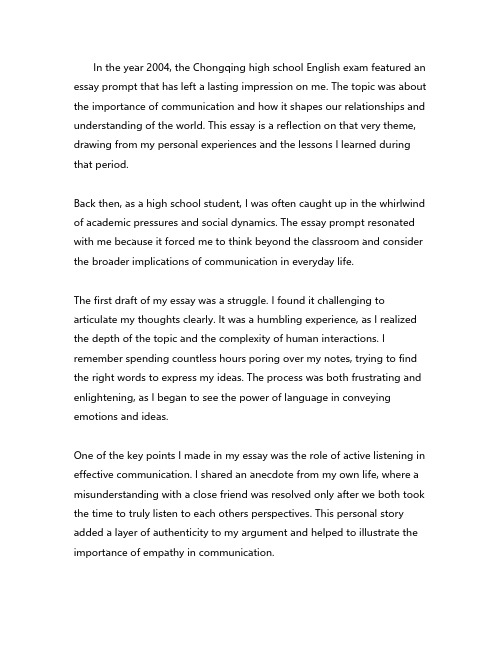
In the year 2004, the Chongqing high school English exam featured an essay prompt that has left a lasting impression on me. The topic was about the importance of communication and how it shapes our relationships and understanding of the world. This essay is a reflection on that very theme, drawing from my personal experiences and the lessons I learned during that period.Back then, as a high school student, I was often caught up in the whirlwind of academic pressures and social dynamics. The essay prompt resonated with me because it forced me to think beyond the classroom and consider the broader implications of communication in everyday life.The first draft of my essay was a struggle. I found it challenging to articulate my thoughts clearly. It was a humbling experience, as I realized the depth of the topic and the complexity of human interactions. I remember spending countless hours poring over my notes, trying to find the right words to express my ideas. The process was both frustrating and enlightening, as I began to see the power of language in conveying emotions and ideas.One of the key points I made in my essay was the role of active listening in effective communication. I shared an anecdote from my own life, where a misunderstanding with a close friend was resolved only after we both took the time to truly listen to each others perspectives. This personal story added a layer of authenticity to my argument and helped to illustrate the importance of empathy in communication.Another aspect I explored was the impact of nonverbal cues in communication. I discussed how body language, facial expressions, and tone of voice can sometimes convey more than words alone. Drawing from examples I observed in my family and among my peers, I argued that being aware of these nonverbal signals can lead to deeper understanding and stronger connections with others.The process of writing the essay also made me reflect on the cultural dimensions of communication. I touched upon the idea that different cultures have unique ways of expressing thoughts and feelings, and that being open to these differences can enrich our communication experiences. I cited examples of cultural exchanges I had witnessed, such as international students sharing their customs and traditions with my classmates, which broadened our perspectives and fostered a sense of global community.One of the most challenging parts of the essay was providing concrete examples to support my arguments. I spent a lot of time researching case studies and gathering data on the benefits of effective communication in various settings, from the workplace to interpersonal relationships. This research not only strengthened my essay but also deepened my understanding of the topic.As I revised my essay, I made sure to maintain a clear structure and logical flow. I organized my thoughts into coherent paragraphs, each focusing on a specific aspect of communication. I also paid close attention to my language use, aiming for a balance between formal academic writing and aconversational tone that would engage the reader.In conclusion, the 2004 Chongqing high school English exam essay prompt was a transformative experience for me. It pushed me to delve into the intricacies of communication and consider its profound impact on our lives. The process of writing the essay taught me valuable skills in critical thinking, research, and effective writing. Most importantly, it opened my eyes to the beauty and complexity of human interaction, inspiring me to strive for better communication in all aspects of my life.。
2004重庆英语高考作文
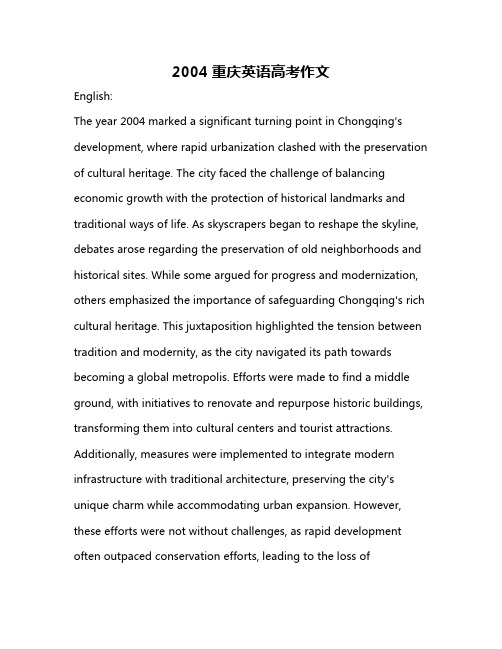
2004重庆英语高考作文English:The year 2004 marked a significant turning point in Chongqing's development, where rapid urbanization clashed with the preservation of cultural heritage. The city faced the challenge of balancing economic growth with the protection of historical landmarks and traditional ways of life. As skyscrapers began to reshape the skyline, debates arose regarding the preservation of old neighborhoods and historical sites. While some argued for progress and modernization, others emphasized the importance of safeguarding Chongqing's rich cultural heritage. This juxtaposition highlighted the tension between tradition and modernity, as the city navigated its path towards becoming a global metropolis. Efforts were made to find a middle ground, with initiatives to renovate and repurpose historic buildings, transforming them into cultural centers and tourist attractions. Additionally, measures were implemented to integrate modern infrastructure with traditional architecture, preserving the city's unique charm while accommodating urban expansion. However, these efforts were not without challenges, as rapid development often outpaced conservation efforts, leading to the loss ofirreplaceable cultural treasures. Nevertheless, the year 2004 marked a crucial period of reflection and action for Chongqing, prompting discussions on the importance of sustainable development and cultural preservation in the face of rapid urbanization.中文翻译:2004年是重庆发展的一个重要转折点,快速的城市化与文化遗产保护之间产生了冲突。
04年高考英语(重庆卷)完形填空题·完全解析
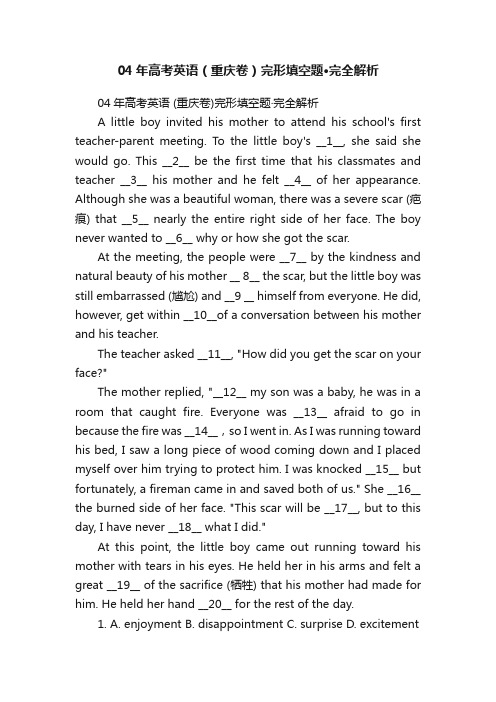
04年高考英语(重庆卷)完形填空题·完全解析04年高考英语 (重庆卷)完形填空题·完全解析A little boy invited his mother to attend his school's first teacher-parent meeting. To the little boy's __1__, she said she would go. This __2__ be the first time that his classmates and teacher __3__ his mother and he felt __4__ of her appearance. Although she was a beautiful woman, there was a severe scar (疤痕) that __5__ nearly the entire right side of her face. The boy never wanted to __6__ why or how she got the scar.At the meeting, the people were __7__ by the kindness and natural beauty of his mother __ 8__ the scar, but the little boy was still embarrassed (尴尬) and __9 __ himself from everyone. He did, however, get within __10__of a conversation between his mother and his teacher.The teacher asked __11__, "How did you get the scar on your face?"The mother replied, "__12__ my son was a baby, he was in a room that caught fire. Everyone was __13__ afraid to go in because the fire was __14__,so I went in. As I was running toward his bed, I saw a long piece of wood coming down and I placed myself over him trying to protect him. I was knocked __15__ but fortunately, a fireman came in and saved both of us." She __16__ the burned side of her face. "This scar will be __17__, but to this day, I have never __18__ what I did."At this point, the little boy came out running toward his mother with tears in his eyes. He held her in his arms and felt a great __19__ of the sacrifice (牺牲) that his mother had made for him. He held her hand __20__ for the rest of the day.1. A. enjoyment B. disappointment C. surprise D. excitement2. A. would B. could C. should D. must3. A. noticed B. greeted C. accepted D. met4. A. sick B. ashamed C. afraid D. tired5. A. included B. passed C. covered D. shaded6. A. talk about B. think about C. care about D. hear about7. A. impressed B. surprised C. excited D. comforted8. A. in sight of B. by means of C. by way of D. in spite of9. A. hid B. protected C. separated D. escaped10. A. understanding B. reminding C. hearing D. learning11. A. carefully B. seriously C. nervously D. anxiously12. A. As B. When C. Since D. While13. A. so B. much C. quite D. too14. A. out of control B. under control C. in control D. over control15. A. helpless B. hopeless C. senseless D. useless16. A. pointed B. showed C. wiped D. touched17. A. ugly B. lasting C. serious D. frightening18. A. forgot B. recognized C. considered D. regretted19. A. honor B. sense C. happiness D. pride20. A. quietly B. slightly C. tightly D. suddenly1-5BADBC 6-10AADAC 11-15ABDAC 16-20DBDBC母爱是伟大的。
- 1、下载文档前请自行甄别文档内容的完整性,平台不提供额外的编辑、内容补充、找答案等附加服务。
- 2、"仅部分预览"的文档,不可在线预览部分如存在完整性等问题,可反馈申请退款(可完整预览的文档不适用该条件!)。
- 3、如文档侵犯您的权益,请联系客服反馈,我们会尽快为您处理(人工客服工作时间:9:00-18:30)。
2004年全国普通高等学校统一招生考试(重庆卷)英语本试卷分第一卷(选择题)和第二卷(非选择题)两部分。
共150分。
考试时间120分钟。
第一卷(三部分,共115分)第一部分听力(共两节,满分30分)第一节(共5小题;每小题1.5分,满分7.5分)听下面5段对话。
每段对话有一个小题,从题中所给的A、B、C三个选项中选出最佳选项选项,并从标在试题卷的相应位置。
听完每段对话后,你都有10秒钟的时间来回答有关小题和阅读下一小题。
每段对话仅读一遍。
1.Where does this conversation take place?A.At a bank B.At a hospital C.At a post office2.what are the two speakers mainly talking about?A.What they do while traveling.B.When they do their homework.C.How they spend their spare time.3.What is the probable relationship between the two speakers?A.Husband and wife. B.Passenger and conductor. C.Customer and shop assistant. 4.What happens to Mr Jordan?A.He is ill. B.He is out of work. C.He is on holiday.5.What does the woman mean?A.She wants to go on watching TV.B.She wants the man to turn the TV off.C.She does not mind what the man will do.第二节(共15小题;每小题1.5分,满分22.5分)听下面5段对话或独白。
每段对话或独白后有几个小题,从题中所给的A、B、C三个选项中选出最佳选项,并标在试题卷的相应位置。
听每段对话或独白前,你将有时间阅读各个小题,每小题5秒钟;听完后,各小题将给出5秒钟的作答时间。
每段对话或独白读两遍。
听第6段材料,回答第6、7题。
6.What is the conversation mainly about?A.Ordering a radio.B.Having the radio fixed.C.Looking for a radio repair shop.7.What does the woman expect the man to do?A.Repair her radio. B.Listen to her radio. C.Buy a new radio for her.听第7段材料,回答第8、9题。
8.What does the man prefer to do?A.Watch games outside.B.Watch TV at home.C.Play ball games with his friends.9.What does the woman want the man to do?A.Do some physical exercise.B.Watch ball games on TV at home.C.Play a football game with his friends.听第8段材料,回答第10至12题。
10.What are the two speakers mainly talking about?A.A chemistry test. B.William Carlos Williams. C.A spoken report.11.What does the woman want the man to do?A.To choose a topic for her report.B.To help her do better in her report.C.To prepare her report on the poet.12.When will the two speakers probably meet?A.At about 2∶00 pm. B.At about 4∶00 pm. C.At about 7∶00 pm.听第9段材料,回答第13至16题。
13.Where does the conversation take place?A.At the party. B.At the library. C.At Professor Blake’s.14.What is the probable relationship between the two speakers?A.Fellow students. B.Family members. C.Teacher and student.15.What does the woman suggest to the man?A. Reading books.B. Going to the beach.C. Going to the library.16.What did the man do last weekend?A.He went to party.B.He got away to the beach.C.He read books in the library.听第10段材料,回答第17至20题。
17.When did people begin to celebrate the new year?A. Before they had ways of measuring time.B. When different national groups appeared.C. After they had free time to celebrate a holiday.18. At what time of the year do all people celebrate New Year’s Day?A. On January the first.B. At different times.C. Between January and February.19. Why is New Year’s Day not the most important in the US?A. It is out of date.B. It is not enjoyable.C. It is close to Christmas.20. What is this talk mainly about?A. History of holidays.B. Celebration of the new year.C. Chinese New Year’s Day.第二部分英语知识运用(共两节,满分45分)第一节:单项填空(共15小题;每小题1分,满分15分)从A、B、C、D四个选项中,选出可以填入空白处的最佳选项。
21. You can eat food free in my restaurant ________ you like.A. wheneverB. whereverC. whateverD. however22.The crazy fans ________ patiently for two hours, and they would wait till the movie star arrived.A. were waitingB. had been waitingC. had waitedD. would wait23. She ________ her hairstyle in her hometown before she came to Chongqing fora better job.A. would changeB. has changedC. changedD. was changing24.“The interest ________ be divided into five parts, according to the agreement made by both sides,” declared the judge.A. mayB. shouldC. mustD. shall25. I intended to compare notes with a friend, but unfortunately ________ couldn’t spare me even one minute.A. theyB. oneC. whoD. it26. Before the war broke out, many people ________ in safe places possessions they could not take with them.A. threw awayB. put awayC. gave awayD. carried away27.They see you as something of a worrier, problems ________ which don’t exist and crossing bridges long before you come to them.A. settlingB. discoveringC. seeingD. designing28.— I think George doesn’t really care for TV plays.— Right, ________ he still watches the program.A. andB. butC. orD. so29.There are eight tips in Dr Roger’s lecture on —sleep, and one of themis : ________ to bed early unless you think it is necessary.A. doesn’t goB. not to goC. not goingD. don’t go30. Laws that punish parents for their little children’s actions against the laws get parents ________ .A. worriedB. to worryC. worryingD. worry31.— One week’s time has been wasted.— I can’t believe we did all that work for ________ .A. somethingB. nothingC. everythingD. anything32.The most important thing about cotton in history is ________ part that it played in Industrial Revolution.A.不填;不填B. the;不填C. the ;theD. a; the33.The husband gave his wife ________ every month in order to please her.A. all half his incomeB. his half all incomeC. half his all incomeD. all his half income34.I failed in the final examination last term and only then ________ the importance of studies.A. I realizedB. I had realizedC. had I realizedD. did I realize35.— Let’s go and have a good drink tonight.— ________ Have you got the first prize in the competiton?A. What for?B. Thanks a lot.C. Yes, I’d like to.D. Why not?第二节:完形填空(共20小题;每小题1.5分,满分30分)阅读下面短文,掌握其大意,然后从36—55各题的四个选项(A、B、C和D)中,选出可以填入空白处的最佳选项。
